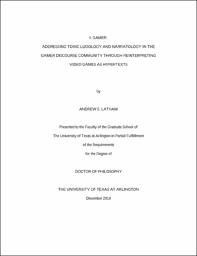
ATTENTION: The works hosted here are being migrated to a new repository that will consolidate resources, improve discoverability, and better show UTA's research impact on the global community. We will update authors as the migration progresses. Please see MavMatrix for more information.
Show simple item record
| dc.contributor.advisor | Richardson, Timothy | |
| dc.creator | Latham, Andrew S. | |
| dc.date.accessioned | 2020-01-10T21:06:20Z | |
| dc.date.available | 2020-01-10T21:06:20Z | |
| dc.date.created | 2019-12 | |
| dc.date.issued | 2019-11-22 | |
| dc.date.submitted | December 2019 | |
| dc.identifier.uri | http://hdl.handle.net/10106/28849 | |
| dc.description.abstract | My research examines two points crucial to the continuing discipline of video game rhetoric. First, it discusses the formation of toxic ludology and narratology in the gamer discourse community over the course of decades. I begin in the 1980s, showing how privilege in the gamer discourse community sowed toxicity that culminated in Gamergate in the 2010s, an event that is still ongoing and destructive to player discourse. In this half of the dissertation, I explore how uninviting gamers can be to new players and also provide examples where more progressive gamers are showing signs of being more inviting to new players in the form of evolving review practices in video game journalism. Second, my research pivots to exploring the possibility of reclassifying video games from cybertexts to hypertexts similar to Wikia articles, a practice that I argue produces a more inclusive atmosphere in the gamer discourse community. In this half of the dissertation, I examine why video games have not previously been classified as hypertexts and then produce a model for rethinking video games as hypertexts using Collin Gifford Brooke’s thoughts on hypertext rhetoric and research produced from speedrunners, a subdivision of the gamer discourse community. Finally, I bring both sides of this dissertation together to produce naronaro theory and ludoludo theory, working applications of how hypertext rhetoric can produce fascinating new types of video game analyses that allow for the inclusion of a broader spectrum of perspectives into the field of video game rhetoric. I hope that this rethinking of video games as hypertexts will lead to greater inclusiveness, greater agency for players, and a place where everyone will matter and everyone is welcome. | |
| dc.format.mimetype | application/pdf | |
| dc.language.iso | en_US | |
| dc.subject | Video game | |
| dc.subject | Rhetoric | |
| dc.subject | Hypertext | |
| dc.subject | Gamergate | |
| dc.subject | Gamer | |
| dc.subject | Ludology | |
| dc.subject | Narratology | |
| dc.subject | Ludoludo theory | |
| dc.subject | Naronaro theory | |
| dc.subject | Gamer discourse community | |
| dc.subject | Hypertext narrative | |
| dc.subject | Video game journalism | |
| dc.subject | Speedrunning | |
| dc.title | I, Gamer: Addressing Toxic Ludology and Narratology in the Gamer Discourse Community Through Reinterpreting Video Games as Hypertexts | |
| dc.type | Thesis | |
| dc.degree.department | English | |
| dc.degree.name | Doctor of Philosophy in English | |
| dc.date.updated | 2020-01-10T21:08:31Z | |
| thesis.degree.department | English | |
| thesis.degree.grantor | The University of Texas at Arlington | |
| thesis.degree.level | Doctoral | |
| thesis.degree.name | Doctor of Philosophy in English | |
| dc.type.material | text | |
| dc.creator.orcid | 0000-0002-5335-3905 | |
Files in this item
- Name:
- LATHAM-DISSERTATION-2019.pdf
- Size:
- 2.341Mb
- Format:
- PDF
This item appears in the following Collection(s)
Show simple item record


